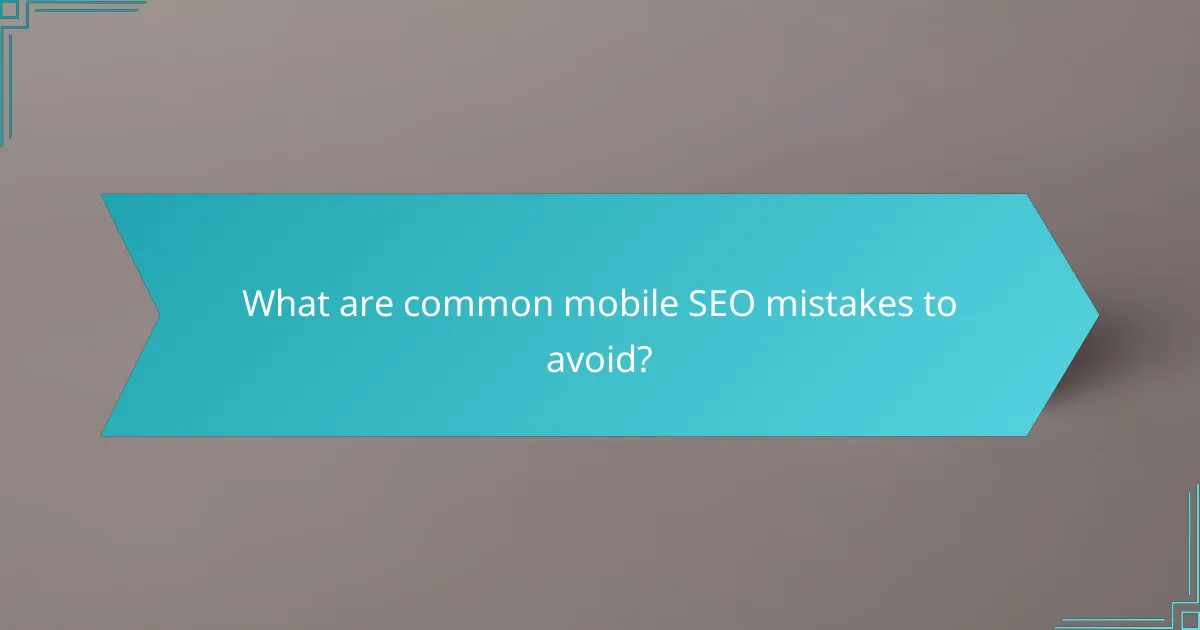To optimize mobile SEO for Latvian websites, it is essential to prioritize responsive design, fast loading times, and mobile-friendly content. By implementing these best practices, you can significantly enhance user experience and boost your site’s visibility in search engine rankings.

What are the best mobile SEO practices for Latvian websites?
To enhance mobile SEO for Latvian websites, focus on responsive design, fast loading times, and mobile-friendly content. Implementing these practices ensures a better user experience and improved search engine rankings.
Responsive design implementation
Responsive design is essential for Latvian websites to provide an optimal viewing experience across various devices. This approach allows your site to adapt its layout based on the screen size, ensuring that users can easily navigate and interact with your content.
Utilize flexible grids and layouts, along with CSS media queries, to create a seamless experience. Test your site on multiple devices to confirm that all elements display correctly and that navigation remains intuitive.
Optimizing page load speed
Page load speed significantly impacts user experience and SEO rankings. For Latvian websites, aim for a load time of under three seconds to minimize bounce rates and keep visitors engaged.
To achieve this, compress images, leverage browser caching, and minimize HTTP requests. Tools like Google PageSpeed Insights can help identify specific areas for improvement.
Mobile-friendly content formatting
Content formatting is crucial for mobile users, who often skim text. Use short paragraphs, bullet points, and headers to break up content and enhance readability on smaller screens.
Ensure that font sizes are legible and that buttons are easily clickable. Test your content on mobile devices to verify that it is accessible and engaging for users.
Utilizing local keywords
Incorporating local keywords is vital for targeting Latvian audiences effectively. Focus on terms that reflect local language usage and regional interests to improve visibility in search results.
Use tools like Google Keyword Planner to identify relevant keywords and phrases. Integrate these keywords naturally into your content, titles, and meta descriptions to enhance local SEO.
Leveraging structured data
Structured data helps search engines understand your website’s content better, improving the chances of appearing in rich snippets. For Latvian websites, implement schema markup relevant to your industry, such as local business or product information.
Utilize Google’s Structured Data Markup Helper to create and test your markup. This can enhance your visibility in search results and attract more clicks from potential customers.

How can I improve mobile page speed in Latvia?
Improving mobile page speed in Latvia involves optimizing various elements of your website to ensure quick loading times. Key strategies include image optimization, minifying CSS and JavaScript, and utilizing content delivery networks (CDNs) to enhance performance.
Image optimization techniques
Optimizing images is crucial for improving mobile page speed. Use formats like WebP or JPEG 2000, which offer better compression without sacrificing quality. Aim for images that are no larger than necessary, ideally under 100 KB for mobile views.
Additionally, implement responsive images using the srcset attribute to serve different sizes based on the user’s device. This ensures that mobile users download only what they need, further enhancing load times.
Minifying CSS and JavaScript
Minifying CSS and JavaScript files reduces their size by removing unnecessary characters, such as whitespace and comments. This can lead to faster loading times, especially on mobile devices with limited bandwidth. Tools like UglifyJS for JavaScript and CSSNano for CSS can automate this process.
Keep in mind that combining multiple CSS and JavaScript files into single files can also reduce the number of HTTP requests, which is beneficial for mobile speed. However, be cautious not to exceed the browser’s limit on file size.
Using content delivery networks
Content delivery networks (CDNs) distribute your website’s content across multiple servers worldwide, allowing users in Latvia to access data from a nearby location. This significantly reduces latency and speeds up loading times for mobile users.
When selecting a CDN, consider options that have a strong presence in the Baltic region to ensure optimal performance. Popular choices include Cloudflare and Akamai, which offer various pricing plans and features tailored to different needs.

What tools can help with mobile SEO analysis?
Several tools can assist with mobile SEO analysis, providing insights into website performance, usability, and optimization. Utilizing these tools can help identify areas for improvement, ensuring your Latvian website meets mobile standards and enhances user experience.
Google Mobile-Friendly Test
The Google Mobile-Friendly Test is a straightforward tool that evaluates whether a webpage is optimized for mobile devices. By entering your URL, you receive immediate feedback on mobile usability, including issues like text size, touch elements, and viewport configuration.
To improve your score, ensure that your site’s content is easily readable on smaller screens and that buttons are adequately spaced. Regularly testing your pages can help maintain mobile-friendliness as you make updates.
PageSpeed Insights
PageSpeed Insights analyzes the loading speed of your website on both mobile and desktop devices. It provides a score from 0 to 100, along with suggestions for improving performance, such as optimizing images and leveraging browser caching.
For Latvian websites, aim for a score in the high 70s or above to ensure a good user experience. Keep in mind that faster loading times can significantly reduce bounce rates and improve search rankings.
SEMrush Mobile SEO Toolkit
The SEMrush Mobile SEO Toolkit offers a comprehensive suite of tools for analyzing mobile optimization. It includes features such as mobile site audits, keyword tracking, and competitor analysis, which can help you understand your position in the market.
Utilizing this toolkit allows you to identify specific mobile SEO issues and track improvements over time. Regular audits can help ensure your site remains competitive in the Latvian market, adapting to changing mobile user behaviors and preferences.

How does local search impact mobile SEO in Latvia?
Local search significantly influences mobile SEO in Latvia by prioritizing location-based results for users. This means that businesses must optimize their online presence to appear prominently in local search queries, especially on mobile devices where users often seek immediate information.
Importance of Google My Business
Google My Business (GMB) is crucial for local SEO as it allows businesses to manage their online presence across Google, including Search and Maps. By claiming and optimizing a GMB listing, Latvian businesses can provide essential information such as address, phone number, and operating hours, which helps improve visibility in local searches.
Regularly updating the GMB profile with accurate information and engaging content can enhance user interaction and drive foot traffic. Ensure that your listing is complete and includes high-quality images to attract potential customers.
Local citation consistency
Local citation consistency refers to maintaining uniform business information across various online directories and platforms. For Latvian websites, this means ensuring that your name, address, and phone number (NAP) are consistent on all listings, including social media and review sites.
Inconsistent citations can confuse search engines and potential customers, negatively impacting your local search rankings. Regularly audit your citations and correct any discrepancies to strengthen your local SEO efforts.
Leveraging user reviews
User reviews play a vital role in local SEO by influencing consumer trust and search engine rankings. Encouraging satisfied customers to leave positive reviews on platforms like Google and Facebook can enhance your business’s credibility in Latvia.
Responding to reviews, both positive and negative, shows potential customers that you value feedback and are committed to customer service. Aim to gather a steady stream of reviews to maintain a strong online reputation and improve your local search visibility.

What are common mobile SEO mistakes to avoid?
Common mobile SEO mistakes include neglecting mobile optimization, failing to ensure fast loading times, and not using responsive design. These errors can significantly impact user experience and search engine rankings, particularly for Latvian websites.
Neglecting mobile-friendly design
A mobile-friendly design is crucial for engaging users on smartphones and tablets. Websites that are not optimized for mobile devices can lead to high bounce rates, as users may struggle to navigate or read content. Ensure your site uses responsive design techniques to adapt to various screen sizes.
Slow loading times
Slow loading times can frustrate users and lead to decreased traffic. Aim for a loading time of under three seconds for mobile pages. Use tools like Google PageSpeed Insights to analyze your site’s performance and identify areas for improvement, such as image optimization and reducing server response times.
Ignoring local SEO
For Latvian websites, local SEO is essential for attracting nearby customers. Ensure your site includes local keywords and is listed on Google My Business. This helps improve visibility in local search results and can drive more foot traffic to physical locations.
Not optimizing for voice search
With the rise of voice-activated devices, optimizing for voice search is increasingly important. Focus on natural language and question-based keywords that users might speak. Consider creating FAQ sections to address common queries, which can enhance your site’s relevance for voice search.
Overlooking mobile usability testing
Regular mobile usability testing can help identify issues that may hinder user experience. Utilize tools like Google’s Mobile-Friendly Test to evaluate how well your site performs on mobile devices. Address any identified problems promptly to maintain a smooth user experience.
